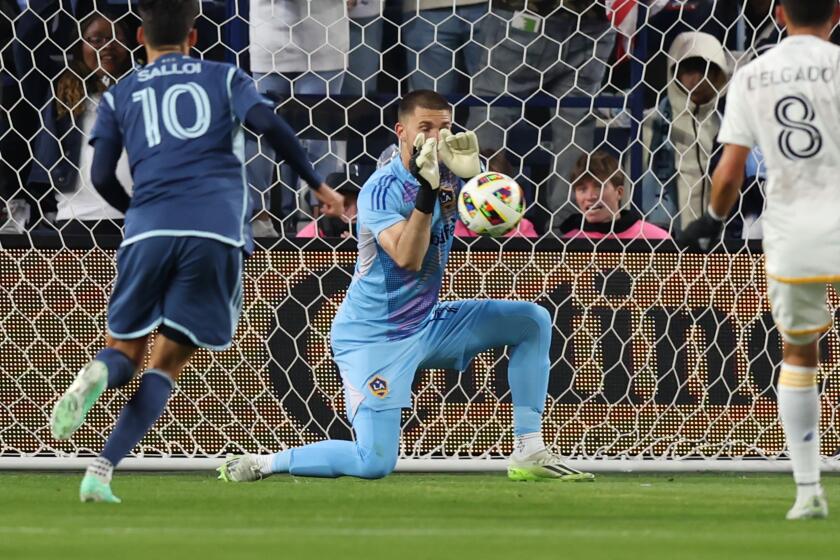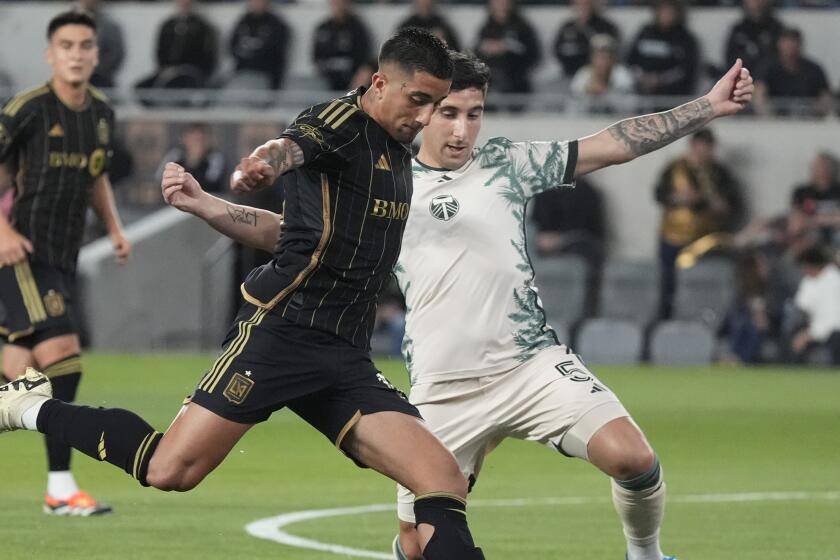Zidane Cites ‘Nasty’ Taunts
French soccer icon Zinedine Zidane on Wednesday finally broke his silence, answering the question on everyone’s mind: What was behind his shocking head butt that felled his Italian opponent in the closing minutes of the World Cup championship?
In interviews on French television, Zidane said Italian defender Marco Materazzi insulted his mother and sister, repeatedly using “harsh, nasty” words that the French captain could not bear to hear.
Zidane’s violent reaction got him ejected from the game and marked a bitter, ugly end to the storied career of this revered son of Algerian immigrants.
“I want to ask forgiveness” from the millions of spectators who watched the match, Zidane said, but, he added, he has no regrets.
“I can’t say I have any regrets about what I did because that would be like admitting that he [Materazzi] had every reason to say what he said,” Zidane said.
Zidane was, he maintained, defending the honor of the female members of his family.
He did not specify what the insults were, and speculation across the globe has focused on several possibilities, including comments laced with sexual innuendo.
“The real culprit should be sanctioned and the real culprit is him,” Zidane said. “He provoked it all.”
Materazzi has acknowledged insulting Zidane but denies insulting Zidane’s mother. Without offering specifics, he said it was the kind of insult that is commonly tossed around the soccer pitch.
Playing in what Zidane said would be his last game, he had tangled with Materazzi in overtime play. By both players’ accounts, Materazzi tugged at Zidane’s jersey; Zidane told Materazzi to stop, that he would give him the shirt after the game.
That ticked off Materazzi, who began goading Zidane in Italian. Zidane, who once played for Turin’s Juventus club, speaks Italian.
Seconds later, Zidane trotted ahead of Materazzi, then suddenly turned, lowered his head and rammed Materazzi in the chest. He crumpled to the ground. Zidane was shown a red card, and the door, leaving France one man down and missing its best kicker as the teams headed into a penalty shootout. France missed a shot, and Italy won its first World Cup title since 1982.
Materazzi has not revealed the exact words he used to taunt Zidane, but in an interview published today in an Italian paper, Materazzi said he considers mothers to be sacred and off-limits
“I didn’t say anything to him involving racism, religion or politics, and neither did I say anything about his mother,” Materazzi said in the interview, which was given before Zidane’s TV appearance. “I lost my mother when I was 15 years old, and I’m very sensitive about mothers.
“Zidane has always been for me a myth, and I admire him greatly.”
Earlier this week, Materazzi also denied a rumor that he called Zidane a terrorist.
Figuring out exactly what Materazzi said has become something of an obsession for sports journalists. Newspapers and TV networks around the world have pondered the question, some hiring lip-reading experts to study Materazzi’s mouth movements.
Many French fans have already forgiven Zidane, one of the most talented players of his generation and one who came to symbolize the alienated Muslim minorities who populate France’s underclass. He grew up in the tough housing projects outside Marseilles and rose to unparalleled fame and success at the head of a team of remarkable racial diversity.
On their return to Paris from World Cup competition in Germany, Zidane and the French team were feted as heroes.
French President Jacques Chirac praised Zidane as “a virtuoso, a genius of world football.” And a record label has released an upbeat song in honor of Zidane, called “Coup de Boule,” French for head butt.
The view in Italy is quite different. While euphoric after Italy’s victory, most Italians seem to hold Zidane fully responsible for what they see as a brutal act of violence. Television news channels labeled Zidane’s interviews Wednesday, skeptically, as “his truth.”
Another commentator said: “The Italians may have their World Cup, but the French still have their Zidane myth. They have truly taken defeat in soccer and transformed it into defense of Zidane.”
FIFA’s disciplinary committee, meanwhile, has opened an inquiry into Zidane’s actions, and FIFA President Sepp Blatter has suggested the French captain could be stripped of the Golden Ball he was awarded by journalists as best player in the World Cup.
In Wednesday evening’s interview with French Canal Plus, a calm, composed Zidane grasped a microphone with one hand, a chocolate-colored jacket draped over his shoulders. He watched clips from France’s 2006 World Cup matches, reviewing key plays with the interviewer.
He said there was “no excuse” for what he did, but no excuse either for Materazzi.
“Do you imagine that in a World Cup final like that with just 10 minutes to go to the end of my career, I am going to do something like that because it gives me pleasure?” he said.
“He had no reason to say what he said. It’s always the reaction that is sanctioned and not the provoker.”
Later, on TF1 television, Zidane said he had accepted what happened, that it must have been ordained from above. He further clarified that the insults hurled by Materazzi were not racist in tone.
But, he told Canal Plus, they were “very personal.”
“You hear those things once and you try to walk away,” he said. “You hear it a second time and then a third time.... I would rather have taken a punch in the jaw than have heard that.”
Wilkinson reported from Rome and Sicakyuz from Paris.





